- Details
- Category: Apeir News
Webinar: The Equity of Vaccination in Asia
June 17th, 2021 at 1:00 – 3:45 pm GMT+7
Find the recording and presentation material in: https://drive.google.com/drive/folders/1YgCM4Tx3vEDtRfvSmOli44RiBBSH8zja?usp=sharing
Coronavirus pandemic has been affected more than 136 million people and caused at least 3,8 million deaths worldwide until 18 June 2021. This pandemic existed for more than a year, but the cases are still increasing in all regions over the world2. Asia is one of the regions with a high percentage of daily confirmed COVID-19 cases. Around 43% of daily confirmed cases come from Asia2. Facing that problem, to control the circumstances and to help prevent further illness and death, the speeding up of vaccination program is one of the critical ways needed. Especially in Asia, vaccination delay might be a problem when the cases trend still increasing globally8. Therefore, it is required to analyze the vaccination progress in Asia.
Realizing the importance of collaboration, coordination, and communication in aiming the equity of vaccination. The Asia Partnership on Emerging Infectious Disease Research (APEIR), in collaboration with the Connecting Organization for Regional Disease Surveillance (CORDS), Ending Pandemic, and Indonesia One Health University Network (INDOHUN), held a Webinar on The Equity of Vaccination in Asia. The event is designed to discuss the best practices and opportunities to improve the COVID-19 vaccination in the countries. The objective of this event is: to describe current practice, plan, and scheme of COVID-19 vaccination from COVAX, especially in South East Asia; to describe current practices and challenges of COVID-19 vaccination in key study countries; to analyze the gap of needs and opportunities for improvement of the COVID-19 vaccination in key study countries, and to generate discussion among participants and speakers on best practices and challenges of COVID-19 vaccination in South East Asia.
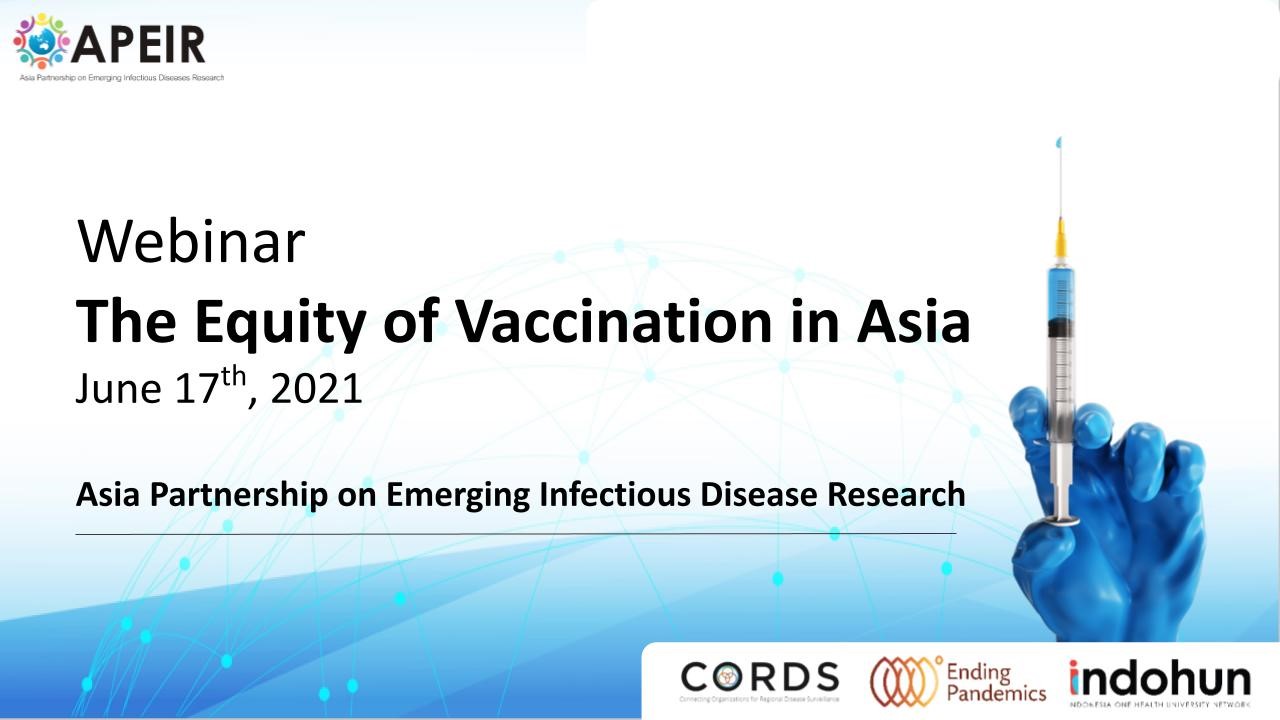
Figure 1. Webinar: The Equity of Vaccination in Asia
.
APEIR successfully conducted the Webinar on 17 June 2021, which 97 participants attended. The Webinar participants were from various institutions and backgrounds, including university, government, and private. They are from Indonesia, Vietnam, Thailand, Singapore, South Korea, Israel, Albania, Netherlands, Tanzania, and the United States. The speakers and experts involved were Dr. Asik Surya, M.P.P.M from Ministry of Health Indonesia; Prof Daniel Cohen from Middle East Consortium for Infectious Diseases Surveillance (MECIDS); Dr. Arturo Pesigan from World Health Organization; and Dr. Kaja Abbas from London School of Hygiene & Tropical Medicine. The discussion led by Prof. dr. Agus Suwandono, MPH, Dr. PH, a professor in epidemiology from School of the Public Health University of Diponegoro and Indonesia One Health University Network.
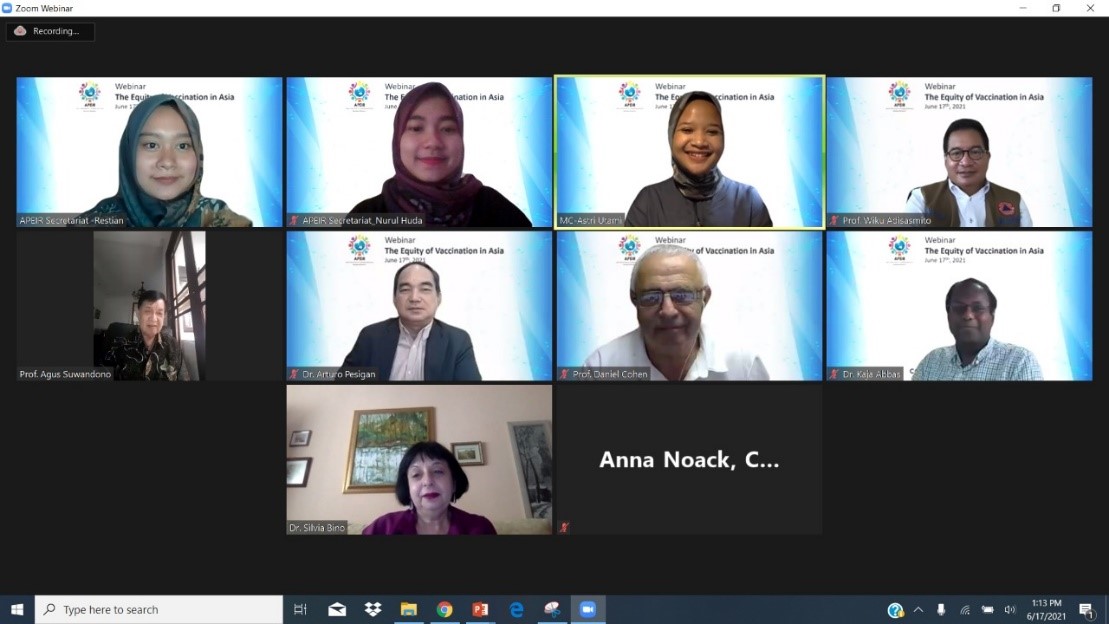
Figure 2. Speakers, Panelists, Moderator, and Organizing Committee
.
Dr. Asik shared the Government of Indonesia's effort to speed up COVID-19 vaccination across the country. It includes regulations, roadmap, human resources, administration, logistics, a network of health facilities, and a monitoring and evaluation system of the COVID-19 vaccination. Professor Cohen also shared the outstanding country effort in Israel in circulating and monitoring, and evaluating the COVID-19 vaccination program. The research shared by Professor Cohen showed that two doses of BNT162b2 were highly effective in preventing laboratory-confirmed SARS-CoV-2 infections and COVID-19 hospitalizations and deaths. Currently, they are continuing evaluation of the performance of the vaccines in "real life," including assessment of indirect protection and duration of protection as well as continuing evaluation of protection against the new variants B.1.351 ”South African” and P.1 “Brazilian” or others (if they will emerge in Israel). In the second session of the Webinar, there were presentations from Dr. Pesigan regarding The Equity of Vaccination in South-East Asia and Dr. Abbas regarding the Health, Economic & Equity Impact of Immunisation: Pre and Post COVID-19 - Vaccine Era.
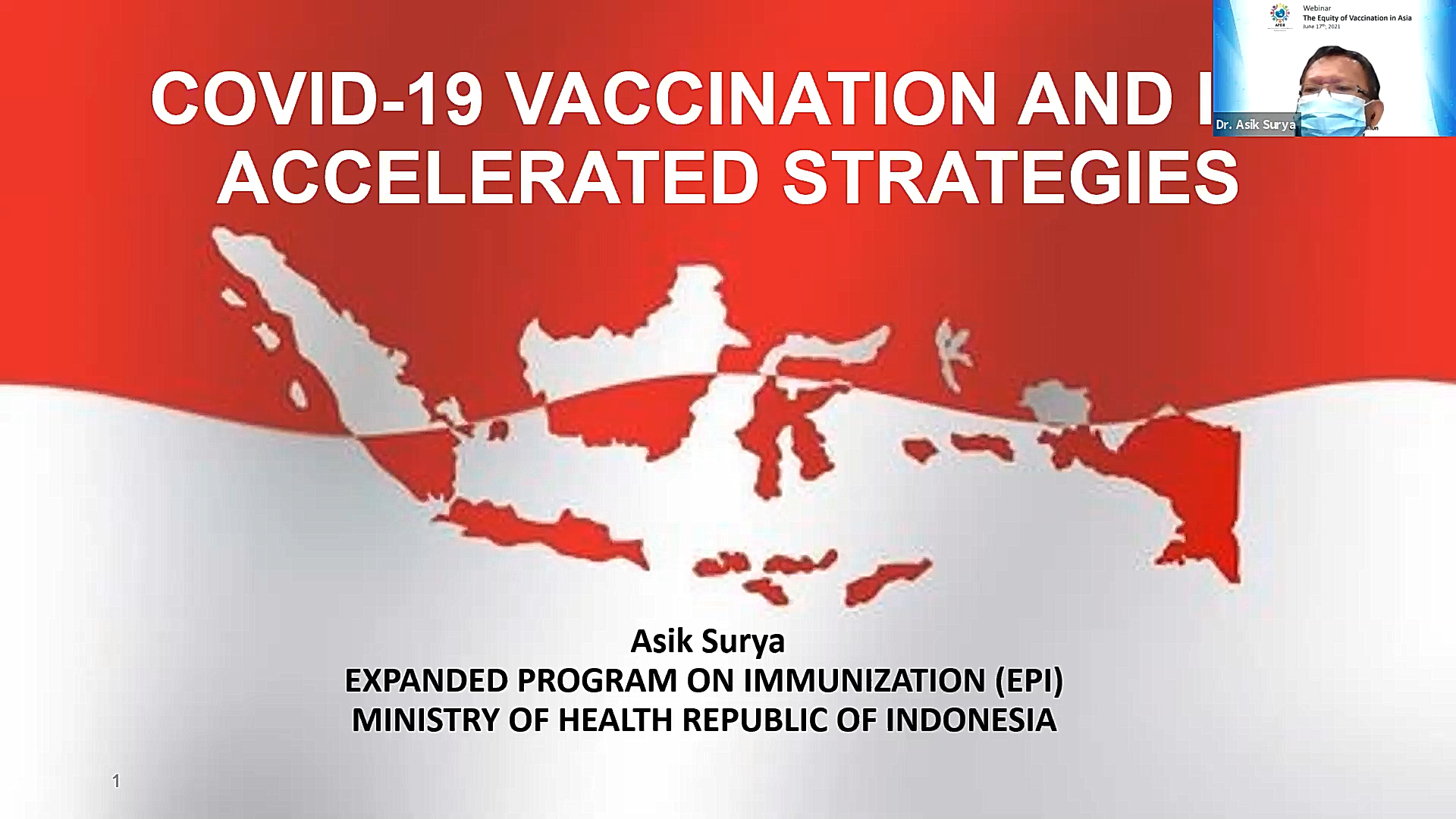
Figure 3. Indonesia presentation
.
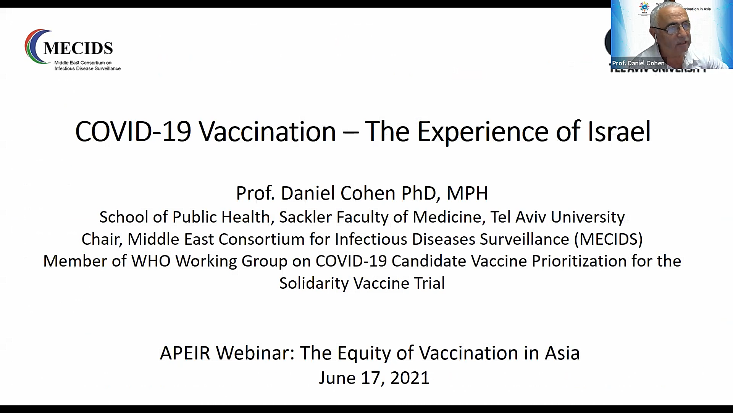
Figure 4. Israel presentation
.

Figure 5. WHO presentation
.
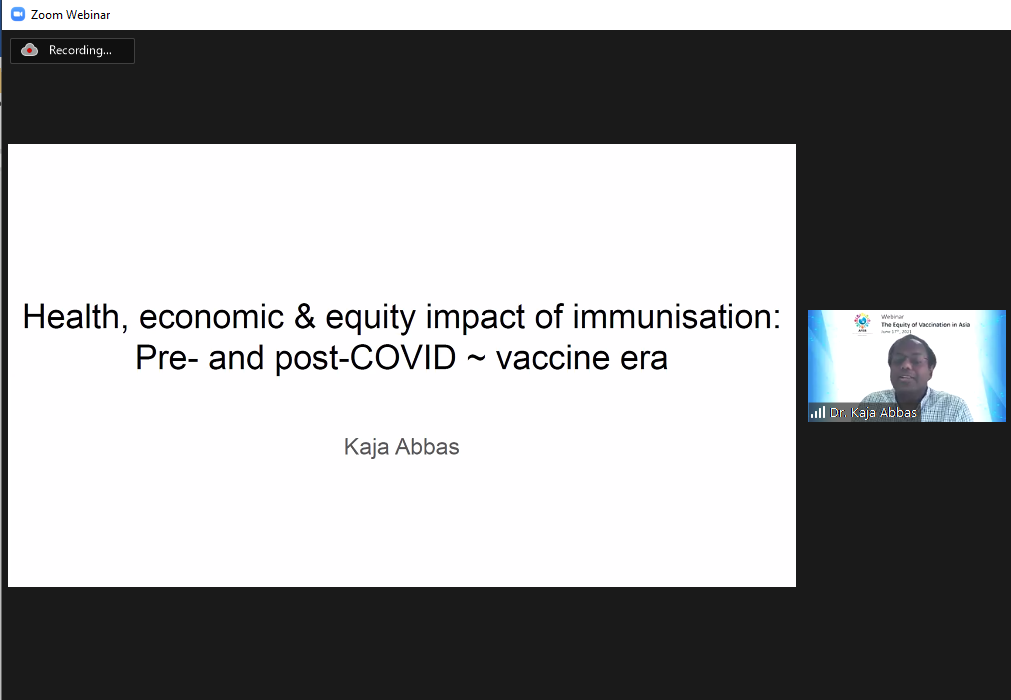
Figure 6. LSHTM presentation
.
The Webinar comes with the conclusion such as:
- The country and the world faces challenges in the equity of the COVID-19 vaccination program.
- The country's vaccination program's success needs support from regulations, availability of human resources, robust administration procedure, logistics, a network of health facilities, and an intense monitoring and evaluation system.
- It also will need strong collaboration and coordination among stakeholders from national to a local level, including but not limited to Ministry of Health, Ministry of Finance, Local Government, Health Facility, Health Workers, Laboratory Officer, Army, Public Health, Epidemiologist, etc.
- It is essential to develop a strategy and method to distribute and provide vaccination to communities across the country. For instance, collaboration with a public and private hospital, empowering primary health care, conducting drive-thru, etc. It will be one of the keys to the success of the vaccination program.
- The intense monitoring and evaluation of the program will also be needed to ensure the effectiveness of the vaccination program. Especially how vaccination impact health and the economy. And how to improve it in the future.
- The pandemic cannot be solved without country effort on Genomic Surveillance and investigation; Surveillance, testing and contact tracing, Public health and social measures, and Health care system readiness.
- The innovative research on the effectiveness of current available COVID-19 vaccines and the COVID-19 new variant still needed to face the challenging rise across the world.
- To end this pandemic and prevent new variants from undermining progress, it needs to vaccinate the world quickly and equitably.
We agreed that there is no one is safe unless everyone is safe.
- Details
- Category: Apeir News
Webinar : Addressing the Global Challenge of Antimicrobial Resistance
December 3rd, 2019 at 1:00 - 2:45 pm GMT +7
Read more: Webinar : Addressing the Global Challenge of Antimicrobial Resistance
- Details
- Category: Apeir News
We bring to your attention the joint statement from the Roundtable Meeting on Zika Virus: Improving Detection, Preparedness, and Response, Through Surveillance and Research in Bali, Indonesia, 17-18 November 2016. Please kindly circulate across your respective networks. Your support is much appreciated.
International Experts Joint Statement on Zika Virus, 18 November 2016, Bali, Indonesia
A group of leading experts met in Bali, Indonesia in November 2016 to discuss how to tackle the devastating disease Zika, a virus spread by mosquitoes. The meeting was organised by the Asia Partnership on Emerging Infectious Disease Research (APEIR) and the Mekong Basin Disease Surveillance Consortium (MBDS) both part of the Connecting Organisations for Regional Disease Surveillance (CORDS) charity which works to reduce and prevent the spread of infectious diseases by exchanging information between surveillance systems globally. CORDS membership covers South East Europe, the Middle East, The Mekong Basin, South East Asia, East Africa and South Africa.
Participants from 15 countries including Vietnam, Singapore and Brazil issued the following statement: “The first human incidences of Zika were in Uganda and Tanzania in 1952 but it was the large Zika outbreak in Brazil in 2015 which attracted worldwide attention because of its association with microcephaly, a congenital condition linked with incomplete brain development, characterised by an abnormally small head. The incidence of defects was so severe that Zika was declared a Public Health Emergency of International Concern. A total of 75 countries* have now been affected and the ease of transportation across borders means many more will suffer.
This meeting was precipitated by the recent Zika outbreaks in South East Asia, with network members in that region wanting to learn from Brazilian experts on how they are dealing with the outbreak, in particular surveillance methods, how they have communicated risk and clinical manifestations such as microcephaly.
Prof. Amin Soebandrio said: “Zika is actually not a new disease, it’s a re-emerging infection that we need to take extremely seriously as we currently have no medicine to tackle it and no cure. Approximately 2.6 billion people** live in an environment suitable for Zika transmission so we must work internationally to urgently improve how we detect and respond to Zika.”
Our six CORDS networks and affiliates agree to collectively respond to Zika and congenital infections by continuing to use a One Health approach. We will:
- Continue collaborative research initiatives to manage the spread of the Zika virus, congenital infections and other vector borne viruses.
- Strengthen our networks’ surveillance and improve our existing control measures.
- Continue our involvement in global prevention and response through surveillance, research and capacity building activities.
- Keep supporting and working with stakeholders and networks, including global level programmes by the World Health Organization, and Centers for Disease Control and Prevention, on information sharing, knowledge transfer and best practice through conferences, training and mentoring.
We are committed to the effective implementation of the above actions and other measures to tackle Zika Virus and other infectious disease threats globally.
-Ends-
* Statistic taken from the World Health Organization – ‘Countries and territories that have reported mosquito-borne Zika virus transmission’, 8th December 2016
** Statistic taken from ‘Potential for Zika virus introduction and transmission in resource-limited countries in Africa and the Asia-Pacific region: a modelling study’ published in The Lancet Infectious Diseases on 1st September 2016.
Organizers:
- Connecting Organisations for Regional Disease Surveillance or CORDS is a charity comprised of six international networks, working to reduce and prevent the spread of infectious diseases by exchanging information between surveillance systems globally. Our vision is a world united against disease. For more information please visit cordsnetwork.orgor contact Anna Noack, This email address is being protected from spambots. You need JavaScript enabled to view it.
- APEIR is a research network, composed of researchers, practitioners and senior government officials from Cambodia, China, Lao PDR, Indonesia, Thailand and Vietnam. For more information please visit http://www.apeiresearch.net
- The Mekong Basin Disease Surveillance (MBDS) consortium comprises six participating countries: Cambodia, China (Yunnan and Guangxi Provinces), Lao PDR, Myanmar, Thailand and Vietnam and a growing number of development partners who together seek to reduce morbidity and mortality caused by outbreak-prone diseases in the sub-region. For more information please visit http://www.mbds.org/
- Details
- Category: Apeir News
7th BIENNIAL CONFERENCE OF THE INTERNATIONAL ASSOCIATION OF ECOLOGY AND HEALTH
ECOHEALTH 2018
Cali, Colombia
15-18 August 2018
Read more: 7th BIENNIAL CONFERENCE OF THE INTERNATIONAL ASSOCIATION OF ECOLOGY AND HEALTH
- Details
- Category: Apeir News
Several APEIR members presented in the One Health and Eco-health Conference in Melbourne, Australia on December 3-7th 2016. The conference aims to showcase contribution, share research on strategies and tools, and present practical examples in the area focus of human, animal, and ecosystem interface to reduce the global health risk.
Prof. Wiku Adisasmito, the APEIR Coordinator presented several topics in panel sessions and posters, including about the Field Epidemiology Revitalization in Indonesia and the Global Health True Leaders Curriculum. APEIR team in Lao PDR represented by Dr. Watthana Theppangna, presented the research activities in Lao PDR which is the surveillance on emerging infectious diseases in wildlife and human behavior study. Furthermore, the AMR team from Indonesia participated in the panel session and presented about Assessment of Doctor’s Knowledge, Attitude, and Practice and Programs in Antimicrobial Resistance in Indonesia. dvm. Riana AryaniAriefwho represented Indonesia there also presented a poster titled “Bijak-Antibiotik” Cadres: A Community Participation Model for Antimicrobial Resistance Prevention Program. All of the presentations are part ofthe APEIR Antimicrobial Resistance research results in Indonesia.
In the One Health South East Asia plenary, Dr. Hung Nguyen from the International Livestock Research Institute, Vietnam presented APEIR’s co-initiativeabout findings and lessons from the Field Building Leadership Initiative.
In the conference, Prof. Wiku Adisasmito discussed APEIR's recent progress with Dr. Dominique Charron from International Development Research Centre (IDRC) Canada. The conference has enabled a platform for ongoing dialogue and collaborative action among researchers, policy makers and practitioners, and among the global One Health and Eco-Health communities.
The next conference will be held in Saskatoon, Canada on June 22-25th 2018.

